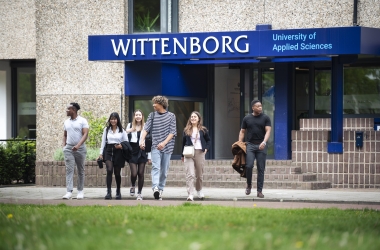Employers in the Netherlands Value International Graduates, Nuffic Report Confirms

International Graduates Bring Innovation and Global Perspective to Dutch Workplaces
International graduates are increasingly recognised as vital contributors to the Dutch labour market, according to a new report by Nuffic titled International Graduates in the Workplace – The Employer’s Perspective.
Drawing on insights from a survey of 382 employers and 34 in-depth interviews with company representatives, the study shows that nearly 80% of employers experience more advantages than disadvantages from hiring international employees – particularly those who have studied in the Netherlands.
Maike Zürcher, HR Manager at Wittenborg, says: “International graduates typically bring flexibility, adaptability and resilience. They are eager to learn and contribute.” She adds that international staff bring diverse perspectives that broaden the company’s outlook and encourage innovation. “They help to prevent being stuck in a country-specific mindset, which is very beneficial for companies wanting to expand their global reach.”
The report highlights the value of international graduates holding Dutch degrees, which provide employers with confidence that these candidates meet local standards and understand Dutch society and work culture. Many graduates gain familiarity with the Dutch way of working through internships during their studies.
Employers in the study also emphasise soft skills such as communication, cultural awareness and emotional intelligence as key strengths of international graduates. According to the report, these personal qualities are often valued more highly than complex technical skills, which are considered teachable.
Zürcher notes a growing interest among Dutch employers in recruiting international graduates: “In the Randstad it has been common for years that the working language shifts to English and companies are more open to recruiting internationals. More and more, this is something that we also observe in companies outside of Randstad, for example in and around Apeldoorn.”
She adds: “Even very people-focused businesses, such as hotels in the region, now employ people who do not necessarily speak Dutch. That in turn leads to normalising it for customers which creates more and more opportunities for internationals.”
Employers in the report expressed the need for closer cooperation with universities, including facilitating internships and providing a dedicated contact person at institutions to improve the transition from study to work.
Wittenborg’s External Relations & Events Manager, Sophia Faraji, also explored this topic in her 2023 master’s thesis, which examined the employability of international graduates from universities of applied sciences in the Netherlands. Her research found that international graduates bring valuable cross-cultural communication skills, adaptability and a global outlook to the Dutch labour market – insights that closely align with the findings of the Nuffic report.
To read the full report International Graduates in the Workplace – The Employer’s Perspective, visit Nuffic’s website.
WUP 21/07/2025
by Erene Roux
©WUAS Press